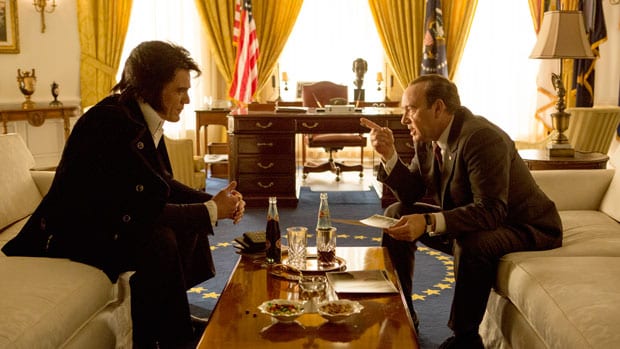Even Kevin Spacey can’t salvage this lame sitcom about a real-life meeting between a President and the King

ARNOLD WAYNE JONES | Executive Editor
jones@dallasvoice.com
Elvis & Nixon opens with the back of President Richard Nixon’s head, as he listens to his morning briefing in the Oval Office. A few seconds later he spins around and we see Kevin Spacey, instantly realizing how, with a minimum of makeup, he is able to transform effortlessly into Tricky Dick. He’s a dead ringer.
The action then cuts to Elvis Presley, played by Michael Shannon (about a decade too old, 40 pounds too light), and that’s where we spend the next 30 minutes … sans Spacey. It’s as if Beyonce came out to sing a song and you had to spend the next half hour with Coldplay. (Oh… right.)
 Elvis & Nixon — which, at barely 80 minutes, would be more suited for a long episode of TV — never recovers from the short tease of Spacey followed by the long reality of Shannon, woefully miscast as the King of Rock ’n’ Roll. There’s no meaningful way in which Shannon evokes Elvis. Certainly not in terms of charisma, of which he is sorely lacking. He does have intensity, but that’s a different thing than what Elvis embodied, as least as translated in Shannon’s Method-y, Lee Strasberg-ish acting choices. There’s no levity, no wit. The comedy (and it is a comedy) falls totally flat. When we finally get back to Spacey, the movie is almost half over, and he simply cannot salvage it at that point.
Elvis & Nixon — which, at barely 80 minutes, would be more suited for a long episode of TV — never recovers from the short tease of Spacey followed by the long reality of Shannon, woefully miscast as the King of Rock ’n’ Roll. There’s no meaningful way in which Shannon evokes Elvis. Certainly not in terms of charisma, of which he is sorely lacking. He does have intensity, but that’s a different thing than what Elvis embodied, as least as translated in Shannon’s Method-y, Lee Strasberg-ish acting choices. There’s no levity, no wit. The comedy (and it is a comedy) falls totally flat. When we finally get back to Spacey, the movie is almost half over, and he simply cannot salvage it at that point.
The story is basically true; in 1970, Elvis Presley — then already beyond his chart-topping years, descending into the rattled, drugged-up state that would take his life within seven years, at age 42 — decided he wanted to “go undercover” for the Feds, acting as a kind of spy in Hollywood to rout out the pushers and dealers selling narcotics.
Of course, he didn’t need to go undercover — they were all on his speed-dial. Nope, Elvis just wanted a cool-ass badge.
The movie fails, and fails big-time, because it never posits any concrete reason why Elvis was seized by this fit of misplaced patriotism, why the badge meant anything to him. Indeed, Elvis whines to his lackeys (Alex Pettyfer, who is good; and Johnny Knoxville, who isn’t) that no one sees him, the man — they see the image he creates. That’s a lazy psychological trope of most wannabe celebrity biopics, and makes even less sense here; by its nature, a badge is precisely intended to make people see what is represents, not the person individually. It’s a damning bit of self-defeatism.
If director Liza Johnson, or Shannon, or the script (co-written by, of all people, Cary Elwes) bothered to work toward explaining this conundrum, there might have been something dramatic to latch onto; or, they could have done what Spacey does, and say, “Hey, this is a comedy — let’s overplay and have fun.” They never do. Spacey is swimming against the tide here; he hints at the caricature underneath his jowly, Nixonian tics. Shannon has no similar sense of lightness in his performance — he’s all dour self-reflection. (Maybe they should have called it Elvis or Nixon — it’s like two separate films.)
Shannon has sniffed in interviews that he carefully studied Elvis for the role, but such evidence is missing from his performance. There are a few minutes, especially from a distance, where he seems to have Elvis’ swagger, but it feels like it’s from the wrong era. The famous photo of Nixon and Elvis together reveals Elvis as already overweight and tired, his eyes hooded from drug abuse, a blank expression looking like a fleshy death mask. He’s a shell of a man, but still more attractive in the face than Shannon, with whom he shares no resemblance. Shannon barely moves his face when he speaks, other than his lips — it is like watching a serpent hiss its lines.
Director Johnson also presents a visually uninteresting piece of film for us to get lost in. The cinematography has a flat, TV-quality brightness to it, which is then edited in with archive footage of a completely different film stock that looks as if it might have been shot by Abraham Zapruder and stored under an outhouse for 40 years. The Oval Office set, especially when compared against the lush verisimilitude of Spacey’s House of Cards, looks cheap and unfinished to the point of being embarrassing.
You watch Elvis & Nixon with a peculiar blend of bemusement and disappointment, sadly wondering how so much potential for a stinging satire went so wrong, in so many ways.
This article appeared in the Dallas Voice print edition April 22, 2016.

